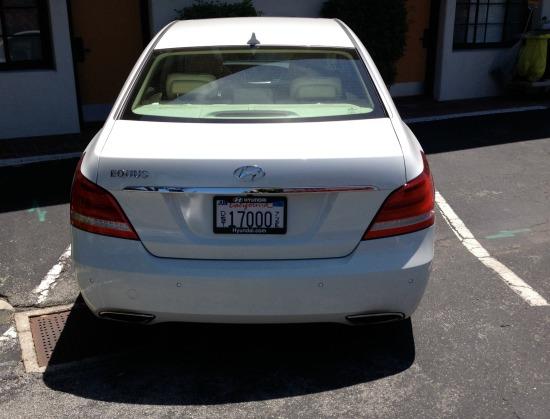As the flagship model, the Hyundai Equus is the largest and most expensive vehicle in the Korean manufacturer’s lineup. It’s a full-size luxury sedan and it’s named after the Latin word for horse.
Hyundai introduced a new version of the Equus on a rear-wheel drive platform in 2009. It’s the carmaker’s direct to aim to compete with the BMW 7 Series, Mercedes S-Class, Audi A8 and Lexus LS.
The Weekly Driver’s Test Drive
For 2014, the Hyundai Equus isn’t a new generation, but it has substantial revisions. Front and rear styling have been altered. And the instrument panel, control layout and various materials have all been updated.
New safety features, include: BlueLink telematics, blind spot and rear cross-traffic alert systems and slight suspension modifications.
The Equus was the only vehicle in the Hyundai lineup I hadn’t driven, and for my weekly driver I was fortunate. I drove the Ultimate, the top-line offering that further stretches the lengthy list of standard features and options.

The standard feature list is exhaustive and, in part, includes: 19-inch wheels, an adjustable air suspension, adaptive bi-xenon headlights, LED fog and running lights, power-folding and auto-dimming mirrors, a rearview camera, front and rear parking sensors, adaptive cruise control, lane-departure, blind-spot and rear cross-traffic alert systems, automatic wipers, a windshield wiper de-icer, a power-closing trunk, sunroof and keyless ignition and entry.






The Ultimate Editions updates include: power-actuated soft-close doors, a power trunk lid, a full LCD instrument panel, head-up windshield display, forward-facing and surround-view cameras, power-operated rear-seat sunshades, power lumbar adjustment for the outboard rear seats, rear-seat head-restraint adjustment, ventilated rear seats, rear vanity mirrors and a dual-screen DVD entertainment system. The interior has been expanded and the Ultimate now seats three in the back.
All Equus models include a 5.0-liter V8 that produces 429 horsepower, rear-wheel drive and an eight-speed automatic transmission.
I drove the Equus on a familiar route: Sacramento to Monterey, an estimated 200-mile trip that features freeway and state highway driving, city streets and the rolling, oddly cambered and curved section of Highway 152 near San Luis Reservoir. It’s always an ideal place to test a vehicle.
The Equus is immediately likable. It’s comfortable, powerful and offers a near-silent ride.
The interior is equally impressive and has been updated with a more high-tech look. There’s a 9.2-inch display for the navigation system. Its functionally isn’t immediately intuitive since the functions look like they’re engaged via a touchscreen approach. In fact, a rotary knob on the center console controls the navigation and other functions.
And there’s more: tri-zone automatic climate control, rear seat climate controls, heated and ventilated power front seats, driver seat memory functions, heated power-reclining rear seats, leather upholstery, extended leather interior trim, a heated power tilt-and-telescoping steering wheel, a power rear sunshade and an auto-dimming mirror.
The speedometer and tachometer look like traditional analog dials, but they’re digital. And then there’s the nifty head-up display. Like other HUD systems, it projects the speed onto the windshield. But it also features turn-by-turn instructions from the navigation system. It’s an impressive idea and helps a driver keep his or her eyes on the road.
Likes:
Spacious interior, particularly the rear seats.
Strong, performance-oriented engine in a sedan.
Smooth, quiet drive.
Innovative head up display on windshield.
Dislikes:
Sub-par gas mileage for segment.
Facts & Figures: 2014 Hyundai Equus
Acceleration: 0-60 mph, 5.6 seconds
Airbags: nine.
Fuel economy: 15 mpg (city), 23 mpg (highway), 18 mpg (combined), six-speed automatic transmission.
Government Safety Ratings: Not yet rated.
Horsepower: 429
Manufacturer’s Suggested Retail Price: $61,000.
Manufacturer’s Web site: www.hyundaiusa.com.
Price As tested: $68,920.00.
Warranty: Bumper-to-bumper, 5 years/60,000 miles; Powertrain, 10 years/100,000 miles; Corrosion, 7 years/unlimited miles; Roadside Assistance, 5 years/unlimited miles.
What Others Say:
“And then there’s the car itself, which is undoubtedly an impressive achievement. Forget about the Hyundai badge and just imagine a V8-powered, rear-wheel-drive, luxury-lined sedan that undercuts most rivals by tens of thousands. The Equus is the executive car for executives who can’t pass up a good deal.” — AutoTrader.
“Overall, the Equus is a solid, full-size luxury sedan with plenty of features and power. For the price and the amount of amenities, there is a lot of bang for your buck here compared to the more expensive German brands and other competitors.” — AutoWeek.
“Granted, the Hyundai doesn’t have the presence, cachet, or even visual recognition of some of the established luxury brands (we still think the styling is anonymous), and the overall refinement is a step or two behind. But the Hyundai still feels like a legitimate big-luxury sedan.” — Popular Mechanics.
The Weekly Driver’s Final Words:
“If you’re buying a luxury sedan for its badge, fine. If you’re buying a luxury sedan for any other reason, seriously consider the Hyundai Equus.”
Article Last Updated: May 21, 2014.

Very nice car that Equus, but I think the guys at the club would laugh when they see the bent “H” (Hyundai emblem) on the trunk lid. Hyundai needs to start a new up-market brand if they want to break into the luxury league.